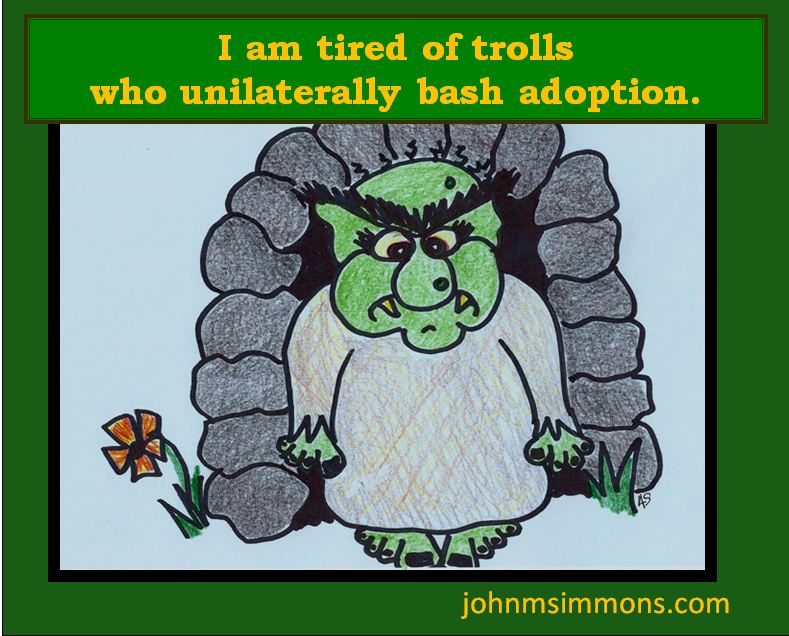Second Choice Doesn’t Mean Second Best
Recently I was digitally reprimanded by someone hiding behind a fake name and profile picture. (Yawn.) The troll found it offensive that my adopted children had to live a life realizing that they had been our second choice when we could no longer have children biologically.
The “me” inside my head, who would argue just for the sake of winning an argument, immediately thought about how horrible it must be for the second child chosen for a team in a sandlot baseball game. Wow. That kid must feel every bit as bad as the kid who walked home crying because neither team allowed him to participate. I bit my online tongue, though, realizing that my job is to help people who are confused about adoption to make sense of all the contradictory information out there.
Life has a way of changing things up on us.
I don’t know a single parent, expecting the arrival of their biological child, who prays that their offspring will be born with less limbs than the majority of children. I would be very confident in suggesting that no pregnant mother ever hoped for her child to be born with Down syndrome. I’m also somewhat convinced that no father ever hoped that his new son would have allergies that would stop them from having a ballpark frank, like everyone else in the stands.
Life has a way of changing things up on us. Often, what we envision is thwarted by conditions that do not fall within statistical averages. Of course we dream based on our lives or conditions being average, or perhaps, even better than average. Why wouldn’t we? I mean, most couples are able to have children biologically. Most children are born with four perfect limbs. A statistically small group of children are born with moderate to severe intellectual challenges. Of course we make plans based on averages. That’s because our brains have evolved to a point beyond peeling bananas and reaction to immediate circumstances. We can plan; so we do.
While there may be a few exceptions from mentally deranged parents, it is almost unfathomable to imagine parents wishing they could trade their new child for a different one in the hospital nursery so that they wouldn’t have to deal with prosthetics, mental challenges or the ability to eat a hotdog on a regular bun at a ball game.
If a child feels like they are unloved or “less loved” because they have food allergies, rather than being born “perfect,” or because their parents turned to adoption after not being able to have children biologically, it is usually because of insecurity. As parents, it is our job to help our children to understand that they really are the ones we wanted. Maybe at one point, we wished for different conditions, but we never wished for someone else, instead of them.
Any parent who would trade their adopted child in if they could have their own biological child needs at least a moderate amount of counseling. Still, that doesn’t mean that many parents who adopt wouldn’t like to have a child biologically.
I wouldn’t trade my son who has Down syndrome for a science prodigy.
My children do understand that we turned to adoption when we could no longer have children biologically. Four of my brother’s children understand that their parents adopted them after having seven biological children, as older ones moved on with their lives. Mom and Dad were old enough that biological family increase was off the table, but they weren’t too old to keep being parents, and they had the resources to give others a real chance to have a successful life within their own family.
I stumble to understand pseudo-logic that says any of those adopted children would be less loved than children who joined a family through biological means. And to indicate that parents view them as less desirable than ones who might have been obtained by biological family building is wrong. I wouldn’t trade my son who has Down syndrome for a science prodigy. I wouldn’t trade my daughter who suffers from mental illness for anyone. I wouldn’t trade any of my adopted children for biological ones, even if it was possible.
My children—all of my children—are the ones I love and the ones I wanted, even if I didn’t find them in the first place I looked.
And to any anonymous troll who would have them feel otherwise, simply because of their own hate and anger, I have only one thing to say. Go back under the bridge.
Afterthought: I have received some feedback on social media that I was wrong in using the term “Second Choice.” Perhaps I was. What I want my children to understand is that my first choice wouldn’t be to have their first families fail. I love them too much to wish such pain on them. It wouldn’t be my first choice for them to have intellectual or mental health challenges. And as adoptive parents, many of us would not have chosen to have fertility issues. Still, all of these situations culminated in us being together, as a family. Regardless of what brought us together, I wouldn’t trade them for anyone. When “door #one” wasn’t an option for us, we selected “door #2.” It turns out that what we found behind “door #2” was better than anything that might have existed behind “door #1.” Forgive me if I used the wrong words, but know that as adoptive parents, we got the best choice in children for our families, regardless of the order that we moved to build them.
More blog articles by John M. Simmons about Adoption
John M. Simmons’ blog

